九年级英语13单元知识点总结
- 格式:doc
- 大小:74.50 KB
- 文档页数:31
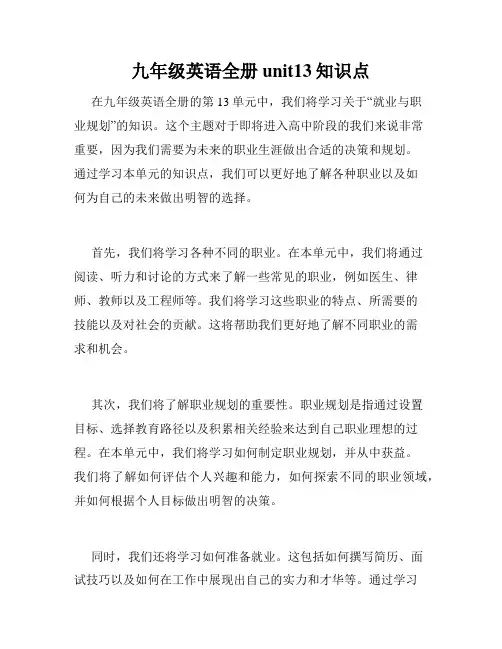
九年级英语全册unit13知识点在九年级英语全册的第13单元中,我们将学习关于“就业与职业规划”的知识。
这个主题对于即将进入高中阶段的我们来说非常重要,因为我们需要为未来的职业生涯做出合适的决策和规划。
通过学习本单元的知识点,我们可以更好地了解各种职业以及如何为自己的未来做出明智的选择。
首先,我们将学习各种不同的职业。
在本单元中,我们将通过阅读、听力和讨论的方式来了解一些常见的职业,例如医生、律师、教师以及工程师等。
我们将学习这些职业的特点、所需要的技能以及对社会的贡献。
这将帮助我们更好地了解不同职业的需求和机会。
其次,我们将了解职业规划的重要性。
职业规划是指通过设置目标、选择教育路径以及积累相关经验来达到自己职业理想的过程。
在本单元中,我们将学习如何制定职业规划,并从中获益。
我们将了解如何评估个人兴趣和能力,如何探索不同的职业领域,并如何根据个人目标做出明智的决策。
同时,我们还将学习如何准备就业。
这包括如何撰写简历、面试技巧以及如何在工作中展现出自己的实力和才华等。
通过学习这些技巧,我们可以更好地应对未来的就业挑战,并为自己创造更好的职业发展机会。
除了以上知识点,本单元还将强调扩展我们的词汇量和提高我们的听力技巧。
我们将通过阅读和听力练习来巩固我们的语言能力,并同时了解不同职业领域的相关专业术语。
通过学习九年级英语全册unit13的知识点,我们将为未来的职业生涯做好准备。
我们将了解不同职业的特点、规划自己的职业道路,并提高我们的语言和沟通技巧。
这将使我们成为更加全面发展的个体,并为未来的成功奠定坚实的基础。
总之,九年级英语全册unit13的知识点将帮助我们更好地了解职业、规划未来并提高我们的语言能力。
这将对我们的个人发展和未来的职业生涯产生积极的影响。
让我们积极学习并努力实践这些知识点,为自己的未来铺平道路。
祝愿我们在未来的职业生涯中取得巨大成功!。
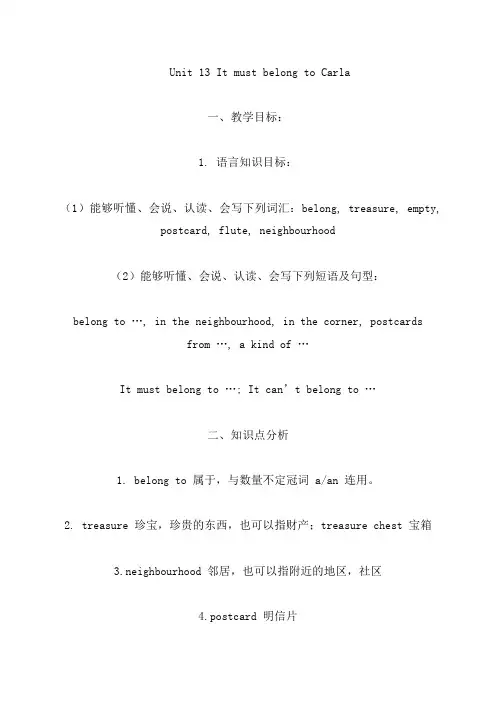
Unit 13 It must belong to Carla一、教学目标:1. 语言知识目标:(1)能够听懂、会说、认读、会写下列词汇:belong, treasure, empty,postcard, flute, neighbourhood(2)能够听懂、会说、认读、会写下列短语及句型:belong to …, in the neighbourhood, in the corner, postcardsfrom …, a kind of …It must belong to …; It can’t belong to …二、知识点分析1. belong to 属于,与数量不定冠词 a/an 连用。
2. treasure 珍宝,珍贵的东西,也可以指财产;treasure chest 宝箱3.neighbourhood 邻居,也可以指附近的地区,社区4.postcard 明信片5.flute 笛子;a kind of … 一种三、重点难点重点:1. 能够熟练应用句型:It must belong to …; It can’t belongto …2. 听懂和会说短语及句型:belong to …, in the neighbourhood, inthe corner, postcards from …, a kind of …难点:1. 听懂和会说生词:treasure, empty, postcard, flute,neighbourhood2. 熟练辨认 in the neighbourhood, in the corner 这两个短语的不同用法。
四、课堂练习1. 根据句意及首字母提示完成单词(1)This postcard b_____ to my aunt.(2)The treasure c_____ is empty.(3)This is a k_____ of flute.2. 选择(1)This postcard is _______ my uncle’s.A. belong toB. belonging toC. belonging(2)The box is in the _______.A. neighbourhoodB. cornerC. street(3)He got many postcards _________ Australia.A. fromB. inC. to3. 句型转换(1)The box belongs to Carla.→It ________ belong to Carla.(2)The box doesn't belong to me.→It _________ belong to me.。
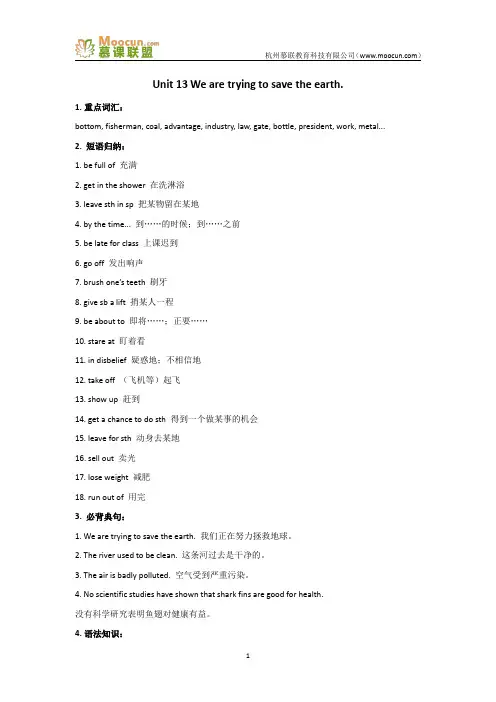
Unit 13 We are trying to save the earth.1.重点词汇:bottom, fisherman, coal, advantage, industry, law, gate, bottle, president, work, metal...2. 短语归纳:1. be full of 充满2. get in the shower 在洗淋浴3. leave sth in sp 把某物留在某地4. by the time... 到……的时候;到……之前5. be late for class 上课迟到6. go off 发出响声7. brush one’s teeth 刷牙8. give sb a lift 捎某人一程9. be about to 即将……;正要……10. stare at 盯着看11. in disbelief 疑惑地;不相信地12. take off (飞机等)起飞13. show up 赶到14. get a chance to do sth 得到一个做某事的机会15. leave for sth 动身去某地16. sell out 卖光17. lose weight 减肥18. run out of 用完3. 必背典句:1. We are trying to save the earth. 我们正在努力拯救地球。
2. The river used to be clean. 这条河过去是干净的。
3. The air is badly polluted. 空气受到严重污染。
4. No scientific studies have shown that shark fins are good for health.没有科学研究表明鱼翅对健康有益。
4.语法知识:英语句子成分分析组成句子的各个部分叫做句子成分。
它包括:主语、谓语、宾语、定语、状语、表语和宾语补足语等。

Unit 13 We are trying to save the earth.1.重点词汇:bottom, fisherman, coal, advantage, industry, law, gate, bottle, president, work, metal...2. 短语归纳:1. be full of 充满2. get in the shower 在洗淋浴3. leave sth in sp 把某物留在某地4. by the time... 到……的时候;到……之前5. be late for class 上课迟到6. go off 发出响声7. brush one’s teeth 刷牙8. give sb a lift 捎某人一程9. be about to 即将……;正要……10. stare at 盯着看11. in disbelief 疑惑地;不相信地12. take off (飞机等)起飞13. show up 赶到14. get a chance to do sth 得到一个做某事的机会15. leave for sth 动身去某地16. sell out 卖光17. lose weight 减肥18. run out of 用完3. 必背典句:1. We are trying to save the earth. 我们正在努力拯救地球。
2. The river used to be clean. 这条河过去是干净的。
3. The air is badly polluted. 空气受到严重污染。
4. No scientific studies have shown that shark fins are good for health.没有科学研究表明鱼翅对健康有益。
4.语法知识:英语句子成分分析组成句子的各个部分叫做句子成分。
它包括:主语、谓语、宾语、定语、状语、表语和宾语补足语等。
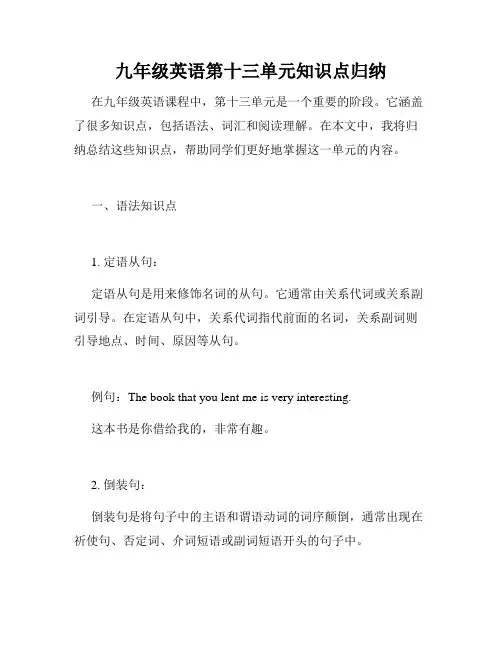
九年级英语第十三单元知识点归纳在九年级英语课程中,第十三单元是一个重要的阶段。
它涵盖了很多知识点,包括语法、词汇和阅读理解。
在本文中,我将归纳总结这些知识点,帮助同学们更好地掌握这一单元的内容。
一、语法知识点1. 定语从句:定语从句是用来修饰名词的从句。
它通常由关系代词或关系副词引导。
在定语从句中,关系代词指代前面的名词,关系副词则引导地点、时间、原因等从句。
例句:The book that you lent me is very interesting.这本书是你借给我的,非常有趣。
2. 倒装句:倒装句是将句子中的主语和谓语动词的词序颠倒,通常出现在祈使句、否定词、介词短语或副词短语开头的句子中。
例句:Not only did he finish his homework, but he also helped his sister.他不仅完成了作业,还帮助了他妹妹。
3. 虚拟语气:虚拟语气用来表示非事实的情况、假设或愿望等。
虚拟语气通常使用“should + 动词原形”来表示。
例句:I wish I should have studied harder for the test.我希望我应该更努力地学习这次考试。
二、词汇知识点1. 短语动词:短语动词是由动词和副词、介词或两者的组合构成的习语。
学生需要牢记这些短语动词的搭配和用法,以便在口语和写作中使用得当。
例句:He tried to put off the meeting, but his boss insisted on having it today.他试图推迟会议,但老板坚持要在今天开。
2. 同义词替换:同义词替换是提升写作水平的关键。
学生需要学会使用不同的词汇来表达相似的意思,以避免文章的重复。
例句:The movie was amazing. The film was fantastic.这部电影太棒了。
3. 词义辨析:词义辨析是学生需要掌握的重要技能之一。
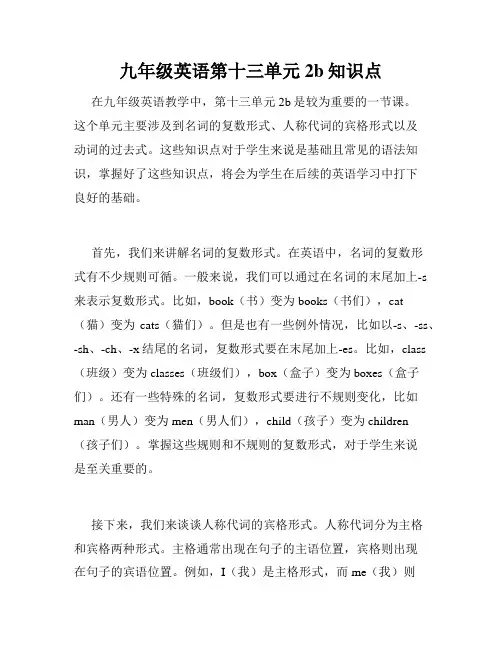
九年级英语第十三单元2b知识点在九年级英语教学中,第十三单元2b是较为重要的一节课。
这个单元主要涉及到名词的复数形式、人称代词的宾格形式以及动词的过去式。
这些知识点对于学生来说是基础且常见的语法知识,掌握好了这些知识点,将会为学生在后续的英语学习中打下良好的基础。
首先,我们来讲解名词的复数形式。
在英语中,名词的复数形式有不少规则可循。
一般来说,我们可以通过在名词的末尾加上-s 来表示复数形式。
比如,book(书)变为books(书们),cat (猫)变为cats(猫们)。
但是也有一些例外情况,比如以-s、-ss、-sh、-ch、-x结尾的名词,复数形式要在末尾加上-es。
比如,class (班级)变为classes(班级们),box(盒子)变为boxes(盒子们)。
还有一些特殊的名词,复数形式要进行不规则变化,比如man(男人)变为men(男人们),child(孩子)变为children(孩子们)。
掌握这些规则和不规则的复数形式,对于学生来说是至关重要的。
接下来,我们来谈谈人称代词的宾格形式。
人称代词分为主格和宾格两种形式。
主格通常出现在句子的主语位置,宾格则出现在句子的宾语位置。
例如,I(我)是主格形式,而me(我)则是宾格形式;he(他)是主格形式,而him(他)则是宾格形式。
掌握人称代词的宾格形式有助于学生在句子中正确使用代词,并表达出正确的语义。
最后,我们来讨论动词的过去式。
在英语中,动词的过去式通常需要变化其词尾。
常见的规则是在动词末尾加上-ed。
比如,play(玩耍)变为played(玩耍过),watch(观看)变为watched (观看过)。
但是也有不规则的动词过去式,比如go(去)变为went(去过),eat(吃)变为ate(吃过)。
对于不规则动词过去式,学生需要通过大量的练习来记忆和掌握。
综上所述,九年级英语第十三单元2b的知识点包括名词的复数形式、人称代词的宾格形式以及动词的过去式。
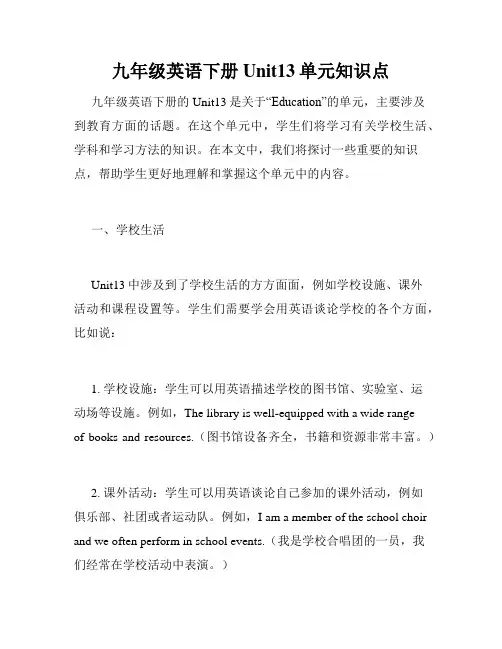
九年级英语下册Unit13单元知识点九年级英语下册的Unit13是关于“Education”的单元,主要涉及到教育方面的话题。
在这个单元中,学生们将学习有关学校生活、学科和学习方法的知识。
在本文中,我们将探讨一些重要的知识点,帮助学生更好地理解和掌握这个单元中的内容。
一、学校生活Unit13中涉及到了学校生活的方方面面,例如学校设施、课外活动和课程设置等。
学生们需要学会用英语谈论学校的各个方面,比如说:1. 学校设施:学生可以用英语描述学校的图书馆、实验室、运动场等设施。
例如,The library is well-equipped with a wide rangeof books and resources.(图书馆设备齐全,书籍和资源非常丰富。
)2. 课外活动:学生可以用英语谈论自己参加的课外活动,例如俱乐部、社团或者运动队。
例如,I am a member of the school choir and we often perform in school events.(我是学校合唱团的一员,我们经常在学校活动中表演。
)3. 课程设置:学生可以用英语介绍自己的课程设置,包括学习科目和上课时间等。
例如,In our school, we have English, math, science, history, and PE. Classes start at 8:30 in the morning and end at 4:00 in the afternoon.(我们学校有英语、数学、科学、历史和体育等科目。
上午8:30开始上课,下午4:00结束。
)二、学科与学习方法除了学校生活,Unit13也涵盖了学科和学习方法的知识。
学生们需要掌握如何用英语讨论各个学科的特点和学习方法。
1. 语言学科:语言学科在学习英语的过程中起着重要的作用。
学生们可以用英语阐述学习英语的好处以及一些学习英语的技巧。
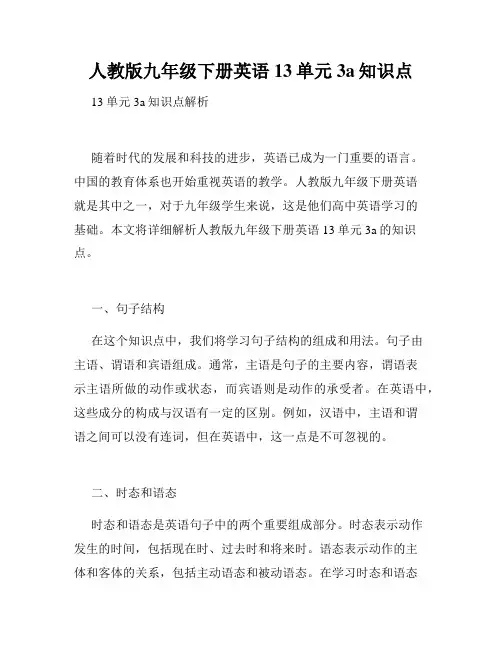
人教版九年级下册英语13单元3a知识点13单元3a知识点解析随着时代的发展和科技的进步,英语已成为一门重要的语言。
中国的教育体系也开始重视英语的教学。
人教版九年级下册英语就是其中之一,对于九年级学生来说,这是他们高中英语学习的基础。
本文将详细解析人教版九年级下册英语13单元3a的知识点。
一、句子结构在这个知识点中,我们将学习句子结构的组成和用法。
句子由主语、谓语和宾语组成。
通常,主语是句子的主要内容,谓语表示主语所做的动作或状态,而宾语则是动作的承受者。
在英语中,这些成分的构成与汉语有一定的区别。
例如,汉语中,主语和谓语之间可以没有连词,但在英语中,这一点是不可忽视的。
二、时态和语态时态和语态是英语句子中的两个重要组成部分。
时态表示动作发生的时间,包括现在时、过去时和将来时。
语态表示动作的主体和客体的关系,包括主动语态和被动语态。
在学习时态和语态时,我们需要注意动词的变化规则和用法。
例如,在一般现在时中,第三人称单数的动词需要加上“s”,而在被动语态中,需要使用助动词“be”和过去分词形式的动词。
三、语法规则除了句子结构、时态和语态外,语法规则也是学习英语的重点。
语法规则是英语句子构成和表达方式的基础。
在英语中,句子的语序和动词的使用是非常重要的。
我们需要注意主谓一致、形容词和副词的用法以及代词的使用等。
此外,介词和冠词的使用也是亟需掌握的知识点。
四、词汇和短语词汇和短语的学习对于提高英语水平至关重要。
在这个知识点中,我们将学习到一些新的单词和短语,并学会正确运用它们。
通过更多的阅读和背诵,我们可以逐渐扩大自己的词汇量,提高自己的语言表达能力。
同时,积累一些常用的短语也会让我们在日常交流中更加得心应手。
五、阅读技巧阅读技巧是提高英语理解能力的重要方法。
在学习阅读技巧时,我们需要注重对文章结构和内容的理解。
通过识别关键词和上下文推断,我们可以更好地理解文章的含义。
另外,阅读的目的也是非常重要的。
我们需要注意区分主旨观点、事实细节和推理判断等不同类型的题目,以提高解题准确度。
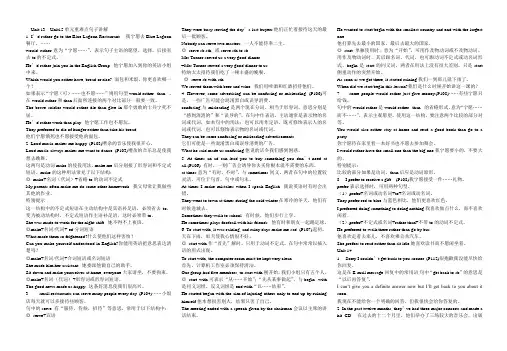
Unit 13---Unit15单元重难点句子讲解1. I’d rather go to the Blue Lagoon Restaurant... 我宁愿去Blue Lagoon 餐厅,……would rather意为“宁愿……”,表示句子主语的愿望、选择,后接省去to的不定式。
He’d rather join you in the English Group. 他宁愿加入到你的英语小组中来。
Which would you rather have, bread or rice? 面包和米饭,你更喜欢哪一个?如果表示“宁愿(可)……也不愿……”则用句型would rather...than...。
在would rather和than后面所连接的两个对比部分一般要一致。
The brave soldier would rather die than give in.那个勇敢的士兵宁死不屈。
He’d rather work than play. 他宁愿工作也不愿玩。
They preferred to die of hunger rather than take his bread.他们宁愿饿死也不愿接受他的面包。
2. Loud music makes me happy. (P103)嘈杂的音乐使我很开心。
Loud music always makes me want to dance. (P103)嘈杂的音乐总是使我想去跳舞。
这两句是动词make的使役用法,make me后分别接了形容词和不定式短语。
make的这种用法常见于以下结构:◎make+名词(代词)+省略to的动词不定式My parents often make me do some other homework. 我父母常让我做些其他的作业。
特别提示这一结构中的不定式短语在主动结构中是宾语补足语,必须省去to,变为被动结构时,不定式短语作主语补足语,这时必须带to。
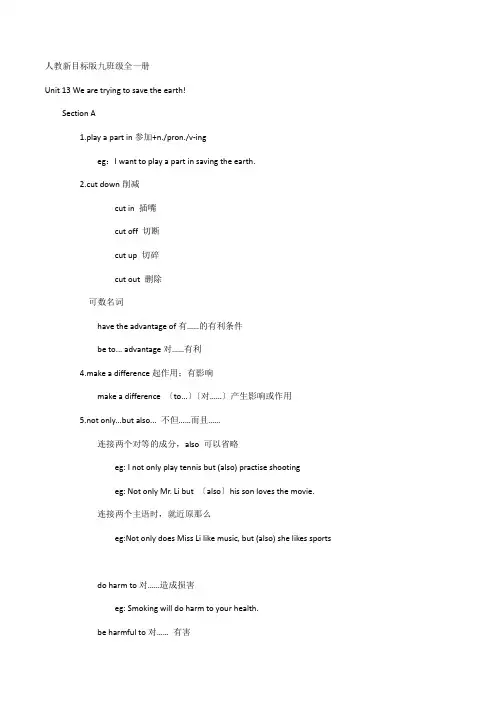
人教新目标版九班级全一册Unit 13 We are trying to save the earth!Section A1.play a part in参加+n./pron./vingeg:I want to play a part in saving the earth.2.cut down削减cut in 插嘴cut off 切断cut up 切碎cut out 删除可数名词have the advantage of有……的有利条件be to... advantage对……有利4.make a difference起作用;有影响make a difference 〔to...〕〔对……〕产生影响或作用5.not only...but also... 不但……而且……连接两个对等的成分,also 可以省略eg: I not only play tennis but (also) practise shootingeg: Not only Mr. Li but 〔also〕his son loves the movie.连接两个主语时,就近原那么eg:Not only does Miss Li like music, but (also) she likes sportsdo harm to对……造成损害eg: Smoking will do harm to your health.be harmful to对…… 有害eg: Don't read in the sun. It is harmful to your eyes7.the number of……的数量eg:The number of girls in our class is 30辨析a number of很多接可数名词复数谓语动词用复数形式the number of……的数量接可数名词复数谓语动词用单三形式8.be against...反对反:be for...支持……eg: I am not against your idea. Instead, I'm for you根本结构be+ 动词的过去分词eg: The glass is broken主动语态We visited that factory last summer.被动语态That factory was visited by us last summer.感官动词/使役动词变为被动语态时带to主动: I often hear Mary sing in the next room被动:Mary is often heard to sing in the next roomSection Beg: We recycle all of our plastic bags.2.throw away扔掉;抛弃eg: You can throw them away if you don't want these clothes.3.pull...down拆下;摧毁put短语pull together齐心协力pull off 脱去pull out拔出pull in(车等)停下,进站4.win a prize赢得奖品win赢,获胜后接竞赛、活动、奖品beat击败;战胜后接人或团队等竞争对手5.set up建立set off/out动身,动身set free释放set down写下,登记6.bring back恢复;归还;带回eg: Please bring back the books to the library.制造者,制造v. create制造adj. Creative 制造性的1. Could you give me some advice on how to lose weight?Well, I think eating healthily can really make_____________difference.A. anB. aC. theD. /2. I'm surprised to see you smoking. You ___________, I remember.A. aren’t used toB. weren’t used toC. didn’t use toD. don’t use to3. So far this year we __________ about half of the road and we are sure that it will be finished on time.A. have builtB. builtC. buildD. are building4. It’s helpful for older adults to exercise, not only_________ them keep their bodies healthily, but it can also helptheir brains.A. it helpsB. helps itC. can it helpD. it can help5. This is really____________ ugly bird,but it is_______useful bird, it can help fisherman catch fish.A. an;aB. an;anC. a;aD. a;an6. There __________ lots of trees in the area.but they have all gone because people built a railway here.A. have beenB. used to beC. have hadD. used to have7. In the past, my grandpa cut ___________trees and cut them ___________for firewoodA. down;upB. up;downC. out;upD. down;off8. The painting on display was _________ by a very famous artist in China.A. createB. createsC. createdD. creating9. The geography teacher told us that the sun __________ in the east.A. had risenB. has risenC. roseD. rises10. In our school library there _______ a number of books and the number of them _________ growing larger and larger.A. is;areB. has;isC. are;isD. have;are11. If all of us pull together, there must be something we can do _________________.A. improve the environmentB. improved the environmentC. improving the environmentD. to improve the environment12. __________ my backpack, but I also lost my way yesterday.A. Not only lost IB. Not only did I loseC. Not only I lostD. Not only I have lostIII. Filling in the blanks below with the correct forms of the given words in the brackets.1. Has he_________(tell) you about what happened on that day?2. If we keep putting waste water into the ocean, sooner or later the ecosystem in the ocean will be __________(destroy).3. The numbers of some kinds of fishes__________( have) reduced since the last century.4. Wild Aid and the WWF are two__________( environment) protection groups around the world.5. Traffic fumes are__________( harm) to the environment.6. Fresh air makes a big______________(different) to our health.7. The girl used to _______________(take) a bus to school, but this morning she walked.8. Everyone should play a role in_______________ (protect) the forest.9. Please remember to _______________(bring) a cloth bag when you go shopping in the supermarket.10. What are your _______________(suggest) for solving the problems?11. _______________ (fish)are allowed to catch fish only in the open season.12. China has rich natural resources, such as___________(coal) and iron.13. A smile, ___________(cost) nothing, but it gives so much to people around you.14. Travelers should throw the rubbish into the _______________(bin) along the pathway in the mountain.15. What’s the _______________(weigh) of the wooden box?16. Don't make so much noise. The children ____________(have) an English lesson right now.17. She used to________(read) English in the morning but now she's used to reading in the evening.18. Every year millions of trees ____________(plant) to make our country more beautiful.19. In the past few years we ____________(learn)about 3000 English words.20. There is such a big noise that I can't ____________(hear) you very well.21. I stopped ____________(use) disposable chopsticks(一次性筷子) last year.22. While I ____________(do)my homework, the phone rang.23. Seeing the tears in her eyes, he quickly took out a piece of ___________ (napkins).24. Have you ever collected waste paper or bottles for____________( recycle)?25. It usually____________(take) me a few minutes to wash my hair.26. Father____________(use) to go to work by car, but now he takes the bus.27. Let's go hiking instead of ____________( stay) at home, shall we?IV. Translation.1. 杰森今日早上乘坐公共汽车上班而不是步行。
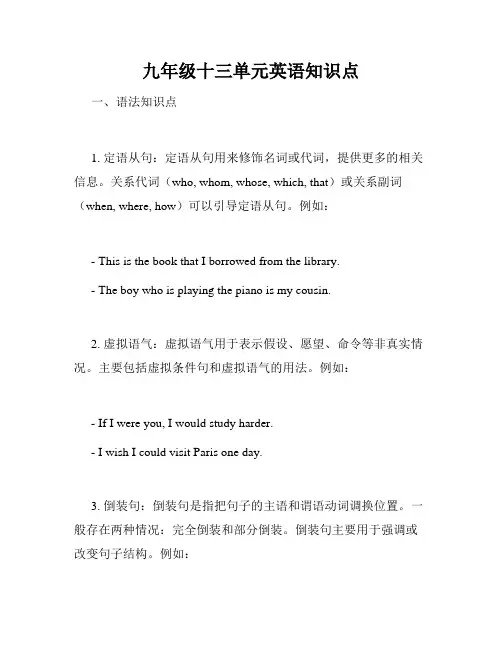
九年级十三单元英语知识点一、语法知识点1. 定语从句:定语从句用来修饰名词或代词,提供更多的相关信息。
关系代词(who, whom, whose, which, that)或关系副词(when, where, how)可以引导定语从句。
例如:- This is the book that I borrowed from the library.- The boy who is playing the piano is my cousin.2. 虚拟语气:虚拟语气用于表示假设、愿望、命令等非真实情况。
主要包括虚拟条件句和虚拟语气的用法。
例如:- If I were you, I would study harder.- I wish I could visit Paris one day.3. 倒装句:倒装句是指把句子的主语和谓语动词调换位置。
一般存在两种情况:完全倒装和部分倒装。
倒装句主要用于强调或改变句子结构。
例如:- Not only did he pass the exam, but he also got the highest score.- In no way can she solve the problem by herself.二、词汇与短语1. 口语交际用语:九年级的学生需要掌握一些日常生活交际用语,例如问候、道歉、道谢、请求等。
这些常用的口语表达能够帮助学生更流利地进行日常对话。
2. 多义词与同义词:在英语中,很多词汇存在多种义项,或者有相似的意思。
学生需要学会根据上下文的意思来正确理解词汇的意思,避免产生歧义。
例如:- The bank is on the left.- I left my bag on the table.3. 词形变化:学生需要学会动词的时态变化、名词的复数形式、形容词的比较级和最高级形式等。
这些词形变化能够帮助提高学生的语言表达能力。
三、阅读技巧1. 猜词义:当学生遇到不认识的单词时,可以通过上下文来猜测其意思。
九年级英语Unit13知识点九年级英语Unit13《We're trying to save the earth!》知识点1.现在进行时定义:表示说话时(瞬间)正在进行的动作,也表示目前或现阶段一直进行的动作。
结构: ①肯定句: 主语+ am/is/are + V-ing②否定句: 主语+ am/is/are + not + V-ing③疑问句: Am/Is/Are + 主语+ V-ing用法:1)表示说话时正在进行的,目前正在发生的动作。
①Look! The big bird is flying away. ②He is watching a movie now.2)表示目前一段时间内正在进行,但说话时可能没有进行的动作。
Right now I am studying Chinese by distance learning. 我现在正通过远程教育学习汉语。
1) 2)常带有表示目前时刻的时间副词, 如:now, right now, at the (very) moment, for the time being, at present, these days 及Look! Listen! ...3)与always, constantly, forever, all the time等副词连用,表示动作反复或习惯。
此时句子常含有说话者的强烈情感在内。
表达较强的“责备”或“表扬”之意①You are always changing your mind. 你总是主意不定。
(太烦人了)②He is always helping othe rs.他总是帮助别人。
(他真是个好人)4)对于come, go, leave, arrive, start, fly, drive等表示位置移动的动词常可用进行时态表将来。
①He is leaving on Wednesday.②Mary isn’t here at the moment. She is coming later.2. used to do过去常常做某事见第四单元及use用法be/get used to doing 习惯于做某事be used to do=be used for doing 被用来做某事3. 被动语态见第五单元注意:接双宾语的词的被动语态;make /let /have sb do的被动语态;see/ hear /notice /find /observe/notice sb do 的被动语态;It’ssaid/reported/believed/supposed/well-known that;及无被动语态的三种情况(感官动词、不及物动词、sell/write等)4. 现在完成时:用法:①过去发生的动作对现在造成的影响或结果:强调结果Yesterday I finished my homework, that’s to say, I have finished my homework now. ②过去已经开始一直持续到现在的动作或状态:强调继续I have lived here since 1990.现在完成时的构成have/has+过去分词现在完成时的四个基本句型肯定句He has finished the work.一般疑问句Has he finished the work?否定句He has not finished the work.两回答Yes ,he has. No, he hasn’t.特殊疑问句What has he done?在下列情形下用现在完成时1九词语①already 已经肯定句中或句尾I have already found my pen. =I have found my pen already.②yet已经否定句和疑问句句尾I have not finished the work yet.Have you bought a computer yet?③ever曾经句中Have you ever seen pandas?④never从不句中I have never been to Beijing.⑤just刚刚句中I have just done my work.⑥before以前句尾I have never been there before.⑦so far到目前为止So far he has learned 200 words.⑧how long多久How long have you lived here?⑨how many times多少次How many times has he been to Beijing?2两词组havegone to去了某地例:He has gone to Beijing (去了北京,没回) havebeen to去过某地例:He has been to Beijing. (去过北京,回了) 3两结构for two months for +一段时间 Jim has lived here for 2 months.since last year since +过去时间点Lucy has been in Beijing since 3 years ago. since 3 years agosince 1990since he came here since +过去时态句子 He has been in China since he came here.4如果句子里面没有时间状语,汉语意思能够加“已经”,往往用现在完成时态。
九年级英语十三单元笔记Unit 13 Travelling
Words and expressions
1. ferry n. 渡口;渡船
2. station n.站;局;所
3. aisle n. 过道
4. assigned adj. 指定的;分配的
5. passport n.护照;入境证
6. destination n. 目的地
7. tourist n. 游客;旅行者
8. guide n. 向导;指南
9. cruise n./v. 巡游;乘船游览
10. airport n. 机场
11. luggage n. (总称)行李
12. tourist attraction n. 旅游胜地
13. check-in v. (在机场)登记;办理登机手续
14. check out 结帐离开;退房
Phrases
1. take the ferry 乘渡船
2. take a break 休息一下
3. be on the way 在路上
4. make a line 排队
5. buy a ticket 买票
6. show one’s passport 出示护照
7. be known for 以……而闻名
8. a sight to see 值得一看的景色
9. have a good time 玩得开心
10. move up the line 向前挪
11. check in at the airport 在机场登记
12. fill in the form 填写表格
13. a piece/items of luggage 一件行李。
九年级下册英语13单元2d知识点本文将介绍九年级下册英语第13单元中的2d知识点。
在这个单元中,我们将学习有关坑洞和酷玩具的知识。
首先,我们来谈谈坑洞。
在九年级下册英语第13单元的教材中,我们学习了关于坑洞的用法和表达。
坑洞是指地面上的洞或凹陷,常常由于天然原因或人类活动导致。
在英语中,我们可以使用词组“fall into a hole”来表示“掉入坑洞”。
例如,当我们说“他不小心掉进了坑洞里”时,可以用“He accidentally fell into a hole”来表达。
此外,我们还学习了与坑洞相关的词汇,如“pit”表示“坑洞”,“sinkhole”表示“天坑”等等。
接下来,让我们转向酷玩具这个话题。
在第13单元的课本中,我们学习了一些有趣的酷玩具,并学会了如何描述它们。
比如,我们可以使用形容词“cool”、“awesome”、“amazing”等来形容一款酷玩具。
我们还可以使用动词“play with”来表示与酷玩具一起玩耍。
当我们说“我喜欢和我的遥控飞机一起玩”时,可以用“I like to play with my remote-control led airplane”来表达。
此外,我们还学习了如何询问别人对酷玩具的看法,例如“你认为这个酷玩具怎么样?”可以用“What do you think of this cool toy?”除了以上的知识点,我们还学习了一些相关的语法和词汇。
例如,我们学习了定语从句的用法。
定语从句用来修饰一个名词,并且在从句中使用关系代词或关系副词。
当我们说“那个坑洞是我不小心掉进的”时,可以使用定语从句来表达:“The hole(that/which) I fell into was my own careles sness”。
此外,我们还学习了表示让步的连词“although”和“though”。
当我们说“尽管那个坑洞很深,但我还是爬出来了”时,可以使用让步连词来表示:“Although/Though the hole was deep, I managed to climb out”。
完整初中九年级的英语第十三单元总结复习短语Unit 13.1. 努力去做try to do / try one ’s best to do2. 拯救地球save the earth3. 河底the bottom of the river4. 向⋯⋯扔throw to / throw at5. 把⋯⋯扔到⋯⋯里throw ...into6. 参与⋯⋯take part in7. 除,去除clean up8. 浪 a waste of time/ waste time9. 解决solve the problem/ the solutions to the problem10.减少空气染cut down air pollution11.可以走的熟食takeaway food12.公共合public places13.起作用,有影响make a difference14.致,把⋯⋯到⋯lead to15.听hear of16.每当each time / every time17.砍掉cut off18.扮演一个角色play a part in19.⋯⋯有害be harmful to/ be bad for20.食物food chain21.在⋯⋯部at the top of/ on the top of22.上in fact23.⋯⋯的数量the number of24.在去的 20 年里in the last 20 years25.目前止so far26.科学研究scientific studies27.⋯⋯有好be good for28.什么做⋯⋯why do29.考做⋯⋯consider doing30.脱困境help out31.改善境improve the environment32.能担得起can afford to do33.采取行take action34.关掉turn off35.加起来add up36.扔掉,抛弃throw away37.上下倒,倒turn upside down38.好好利用put ... to good use39.由⋯⋯建造be built out of40.因⋯⋯而著名,be known for/ be famous for41.一个非常不同常的女 a most unusual woman42.坏,拆pull down43.由⋯⋯制作be made of / be made from44.win a prize45.,建set up46.不但⋯⋯而且not only .... but also47.恢复,使想起,bring back。
Unit 13 W e’re trying to save the earth!知识点总结词汇过关1.v. 乱扔n. 垃圾;废弃物2. n. 底部;最下部4. n. 煤;煤块5.adj. 公众的;公共的n. 民众;百姓6.adj. 丑陋的;难看的7.n. 优点;有利条件8. v. 花费n. 花费;价钱9.adj. 木制的;木头的10.adj. 塑料的n. 塑料;塑胶11. 有关系,作用,影响12. n. 鲨鱼13. n(.鱼)鳍14.(短语)割掉;砍掉15. n. 方法;措施16. adj. 残酷的;残忍的17. adj. 有害的18. n. 链子;链条19. n. 生态系统20.adj(.数量等)减少的;低的;矮的21. n. 工业;行业22. n. 法律;法规23. adj.可重复使用的;可再次使用的24. v. 承担得起(后果);买得起25. n. 运输业;交通运26. v. 回收利用;再利用27. n. 餐巾;餐巾纸28.(短语)颠倒;倒转29.n. 大门30.n. 瓶;瓶子31.n. 负责人;主席;总统32. n. 灵感;鼓舞人心的人(或事物33.n. 金属34.n. 创造力;独创性一.本单元语法复习:(1)现在进行时(1)含义:表示正在发生或进行的动作。
(2)基本结构:主语+ be + 现在分词(be 的形式随主语的变化而变化)(3)基本用法:①表示现在正在进行的动作。
特征:常常与now或具体的时间连用,有时句中会有感官动词来提示,或通过上下文来暗示。
②表示现阶段一直进行的动作。
这类动词常常是延续性动词。
常于at present, this week, these days等连用。
③表示主语的特征、性格、能力等(2)现在完成时(1)含义:表示过去发生的动作对现在还有影响。
(2)基本结构:主语+ have / has + 过去分词(3)基本用法:①表示过去发生的动作,但强调对现在产生影响。
九年级全一册英语13单元笔记以下是九年级全一册英语13单元的笔记,供您参考:1. 重点单词和短语identity:身份digital:数字的technology:技术purchase:购买convenience:方便credit card:信用卡online transaction:网上交易secure:安全的website:网站password:密码private information:个人信息cybercrime:网络犯罪identity theft:身份盗窃virtual currency:虚拟货币cybersecurity:网络安全2. 重点句型和表达How can we protect ourselves from cybercrime?(我们如何保护自己免受网络犯罪的侵害?)We should always use strong and unique passwords for each account.(我们应该为每个账户使用强而独特的密码。
)Cybersecurity is important because our personal information could be stolen.(网络安全很重要,因为我们的个人信息可能会被盗。
)The best way to prevent identity theft is to keep your personal information private.(防止身份盗窃的最佳方法是保持您的个人信息私密。
)When making online transactions, we should always use secure websites.(在进行网上交易时,我们应该始终使用安全的网站。
)3. 语法重点现在进行时(Present Continuous Tense):表示正在进行的动作或状态。
结构为“be动词+动词的现在分词”。
Unit 1一、知识点in : 在旅馆的登记入住。
Check out: 在旅馆结账离开。
: ①通过…..方式(途径)。
例:I learn English by listening to tapes.②在…..旁边。
例:by the window/the door③乘坐交通工具例:by bus/car④在……之前,到……为止。
例:by October在10月前⑤被例:English is spoken by many people.与what的区别:how通常对方式或程度提问,意思有:怎么样如何,通常用来做状语、表语。
what通常对动作的发出者或接受者提问,意思为什么,通常做宾语,主语。
①How is your summer holiday? It’s OK.(how表示程度做表语)②How did you travel around the world? I travel by air.③What do you learn at school? I learn English, math and many other subjects.①What…think of…?How…like…?②What…do with…?How…deal with…?③What…like about…? How…like…?④What’s the weather like today? How’s the weather today?⑤ What to do? How to do it?. What do you think of this book?=How do you like this book?I don’t know what I should do with the matter.=I don’t know how I should deal with it.What do you like about China?=How do you like China?I don’t know what to do next step?=I don’t know how to do it next step?㊣ What good / bad weather it is today!(weather为不可数名词,其前不能加a )㊣ What a fine / bad day it is today! (day为可数名词,其前要加a )4. aloud, loud与loudly的用法: 三个词都与"大声"或"响亮"有关。
①aloud是副词,重点在出声能让人听见,但声音不一定很大,常用在读书或说话上。
通常放在动词之后。
aloud没有比较级形式。
如: He read the story aloud to his son.他朗读那篇故事给他儿子听。
②loud可作形容词或副词。
用作副词时,常与speak, talk, laugh等动词连用,多用于比较级,须放在动词之后。
如:She told us to speak a little louder. 她让我们说大声一点。
③loudly是副词,与loud同义,有时两者可替换使用,但往往含有令人讨厌或打扰别人的意思,可位于动词之前或之后。
如:He does not talk loudly or laugh loudly in public. 他不当众大声谈笑。
5. voice 指人的嗓音也指鸟鸣。
sound 指人可以听到的各种声音。
noise 指噪音、吵闹声6. find + 宾语+ 宾补(名词形容词介词短语分词等)例:I find him friendly. I found him working in the garden.We found him in bed. He found the window closed.We found her honest.7. 常见的系动词有:①是:am 、is、are②保持:keep、stay③转变:become、get、turn④……起来feel、look、smell、taste、sound8. get + 宾语+宾补(形容词过去分词动词不定式)使某种情况发生例:Get the shoes clean. 把鞋擦干净Get Mr. Green to come. 让格林先生进来I want to get my bike repaired. 我想去修自行车You can’t get him waiting. 你不能让他老等着9. 动词不定式做定语①与所修饰的名词构成主谓关系The next train to arrive was from New York. He is always the first to come.②与所修饰的名词构成动宾关系I have nothing to say. I need a pen to write with.I need some paper to write on. I don’t have a room to live in.10. practice , fun 做名词为不可数名词11. add 补充说又说12. join 加入某团体并成为其中一员 attend 出席参加会议或讲座 join in与take part in指参加到某项活动中去。
、both、always以及every复合词与not连用构成部分否定。
其完全否定为:all---none, both---neither, everything---nothing, everybody---nobod y.14. be afraid of doing sth. / sth.害怕be afraid of being alonebe afraid to do sth.害怕be afraid that恐怕担心,表示委婉语气:①放在否定句末表示“也”②两者中的“任一”③either…or…或者…或者.…引导主语部分,谓语动词按照就近原则完成,是个较正式的词,后不能接动名词finish指日常事物的完成,an 与序数词连用表示“又一”,“再一”。
例:Please give me a second apple. There comes a fifth girl. trouble/difficult/problem (in) doing….. 干…..遇到麻烦,困难除非,如果不,等于“if not”本身就表示否定,引导条件状语从句,主句为将来时,条件状语从句用一般现在时表示将来。
例:My baby sister doesn’t cry unless she’s hungry.=My baby sister doesn’t cry if she isn’t hungry.Unle ss you take more care, you’ll have an accident.如果你不多加小心的话,你会出事的。
: adv. 代替,更换。
例:We have no coffee, would you like tea instead?我们没有咖啡了,改喝茶好吗?It will take days by car, so let’s fly instead.开车去要好几天呢,咱们还是坐飞机吧。
Tom was ill, so I went instead.汤姆病了,所以换了我去。
instead of doing sth. 作为某人或某事物的替换例:Let’s play cards instead of watching TV.We sometimes eat rice instead of potatoes.Give me the red one instead of the green one.口头的,口语的。
spoken English 口头英语speaking 讲话的,说某种语言的。
Speaking skills讲英语的能力22. 提建议的句子:①What/ how about +doing sth.? 如:What/ How about going shopping?②Why don’t you + do sth.? 如:Why don’t you go shopping?③Why not + do sth. ? 如:Why not go shopping?④Let’s + do sth.如:Let’s go shopping⑤Shall we/ I + do sth.? 如:Shall we/ I go shopping?23. a lot 许多常用于句末如:I eat a lot. 我吃了许多。
24. too…to 太…而不能常用的句型too+adj./adv. + to do sth. 如:I’m too tired to say anything. 我太累了,什么都不想说。
25. not …at all 一点也不根本不如:I like milk very much. I don’t like co ffee at all.我非常喜欢牛奶。
我一点也不喜欢咖啡。
not经常可以和助动词结合在一起,at all 则放在句尾/ get excited about sth.=== be / get excited about doing sth.=== be excited to do sth. 对…感兴奋如:I am / get excited about going to Beijing.===I am excited to go to Beijing. 我对去北京感到兴奋。
27. ①end up doing sth 终止做某事,结束做某事如:The party ended up singing. 晚会以唱歌而结束。
②end up with sth. 以…结束如:The party ended up with her singing. 晚会以她的歌唱而告终。
28. first of all 首先. to begin with 一开始later on 后来、随29. also 也、而且(用于肯定句)常在句子的中间either 也(用于否定句)常在句末too 也(用于肯定句) 常在句末=as well30. make mistakes 犯错mistake sb. for …把……错认为……make mistakes (in) doing sth. 在干某事方面出错by mistake 错误地;由于搞错mistake---mistook----mistaken如:I often make mistakes. 我经常犯错。